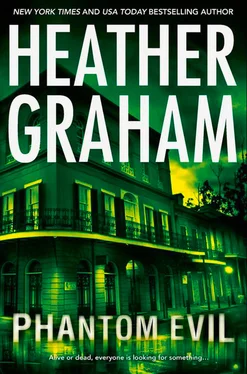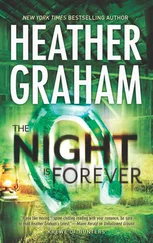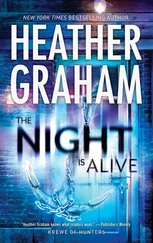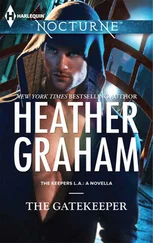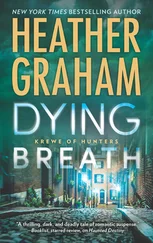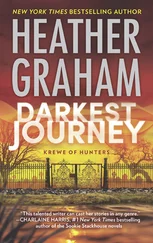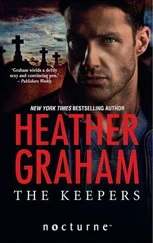1 ...7 8 9 11 12 13 ...17 “Don’t forget that part of me is clansman,” he said.
“All for the good of the clan?” she asked.
He laughed. “We’re big into standing up for one another in feuds,” he said. “Actually and honestly, I do play well with others.”
Their server arrived with their food orders. She opted for another glass of wine and Jackson decided on a second scotch. He laughed and teased the pretty girl serving them, pleasantly, and not obnoxiously, Angela noted. He was still smiling when she left them at the table with their fresh drinks and plates of food.
“Do you see ghosts?” Jackson asked her.
She froze, startled by the sudden impact of the question. She had to force herself to swallow her bite of food.
“Do you?” she replied.
He took another sip of scotch, and his eyes met hers squarely. “I believe that the world is full of possibilities. Do I believe in ghosts like the ones on TV? No. I’m pretty sure that if ghosts exist they are around both by day and night, and that we don’t need to see a lot of people with their eyes wide open—deer–caught–in–the–headlights—jumping at every sound.”
“Logical,” she told him.
“Pardon?”
“Logical. If they exist, they must exist in daylight as well as in the middle of the night.”
“What about Griffin?” he asked her.
Once again, she froze. He had a knack for throwing in a tough question just when she had relaxed.
“What about him?” she asked dully. “He’s dead.”
“Do you ever ‘see’ him?”
She shook her head. “No.”
“You two were together for years,” he commented.
“Five, to be exact.”
“You didn’t foresee his death?” he asked.
She stared at him, every muscle in her body as tense as piano wire. “When they told us that the cancer had spread into every organ and riddled his bones, yes, I foresaw it.”
“I’m sorry,” he said. “I wondered if it made you—susceptible.”
“Susceptible to what?” she demanded.
“Seeing ghosts. I just wanted to make sure that you were over it, and that you were standing on even ground.”
“Am I over it? Do we ever get over the loss of loved ones? No—I have never managed to do so. My parents, and Griffin, are always alive in my heart. Do I accept the reality of it? Yes. And they are all gone. Gone. They don’t come and take my hand and direct me to dead bodies—or to lost children, for that matter.” She paused, needing to wet her lips. She didn’t sip her wine, she chugged it. Most unattractive, she was sure; she didn’t care. He could be so completely courteous. He could make her comfortable, he could make her laugh. And then, he could home right in for the kill.
“What about you?” she demanded more heatedly than she had intended. “Do your lost field agents come and speak to you in the night? Do they ask you how you didn’t happen to get there in time to save them?”
There wasn’t so much as a crack in his expression, not a change whatsoever in the steady dark blue eyes that surveyed her.
“No. They are gone. Like you, I accept that they are gone. Like you, I do remain haunted by the lives they once led.”
She flushed. He should feel badly for badgering her about the losses in her life. She was left feeling similarly—but she had phrased her words in a much meaner manner.
“I’m sorry,” she murmured uncomfortably. Damn him! She didn’t need to be apologizing to him.
“One thing is true—we can’t undo the past. We can only do our best in the present, and hope to find the answers in the future. Dessert? Coffee?” he asked her.
She shook her head. “No, thank you.”
“Want to split a bread pudding? It’s out of this world here.”
She sat back, still uneasy, and totally baffled by his ability to remain so unruffled. She had been tested throughout dinner, she realized.
“I’m fine, thank you.”
“Another glass of wine?” he asked.
“Fine, why not?”
He ordered brandy and bread pudding, and she had another glass of wine. His conversation turned casual. He talked about his love for the city; he had worked here for nearly a year when he had first joined the bureau. “Things are always just a little bit different in these parts. Louisiana laws are still based on Napoleonic Code—French law—while the majority of the country is based on English law. It’s not major, but there are some differences. You’ll note they have parishes instead of counties.”
“I went to Tulane. I know that,” she told him. Inane. He had her dossier.
“And majored in history and philosophy,” he said.
She nodded. “And you?”
He shrugged. “I spent six years in college. I liked it. I might have stayed a college student all my life, but it doesn’t pay the bills. World religions, history and psychology.”
Angela frowned. “Psychology, of course. You were with a Behavioral Science Unit. So, tell me, because I was thinking today that someone as involved as Regina was in preparing that home to be the perfect welcoming point for her husband wouldn’t have committed suicide. And to be honest, suicide had sounded like an entirely rational explanation to me before.”
“It’s hard to say. I didn’t know her,” Jackson said.
Dessert and drinks arrived. He was persuasive; she did try the bread pudding, and it was delicious. And it felt oddly intimate to share a dessert. She hadn’t done so in years. Since Griffin had died.
He sipped his brandy. “It does seem as if she was devoted to her husband, and as if she had determined to put her life to good use. That speaks against suicide. But then again, the loss of a child might have made her snap.”
“But that kind of snap? Going over a balcony?” Regina asked.
“That’s what we’re here to find out,” he told her.
They left soon after. The walk back down Chartres Street was quiet; they took St. Peter’s up to Dauphine and crossed Bourbon once again. They were at the more subdued end of Bourbon there, but distracted, Angela had been walking a few steps ahead.
“Hey, honey, wanna party?” someone asked.
He was a blond frat boy. He looked harmless. He was with other blond frat boys.
She could take care of herself, she knew. But Jackson stepped forward easily, slipping an arm around her. “Not tonight, but you all have a good time, and take care,” he said pleasantly.
The frat boys waved and went on. Jackson’s hold on her eased, but they walked next to each other.
He didn’t say anything; neither did she. He knew she could have managed on her own; she knew that he had quickly defused the situation.
And then they were back. They’d left lights on, and the house on Dauphine stood white and dignified in the moonlight, captured in shadow and in a soft glow. The windows might have been eyes, and, Angela thought, the ghosts of dozens of lost souls might have looked out from behind them, gazing at the world they had left behind.
The house wasn’t evil, but evil had lived behind the facade.
Angela was suddenly certain that Regina Holloway had not committed suicide.
Before retiring for the night, Jackson had done a survey of the house, studying the alarm system.
He’d learned two things: every window in the house was properly wired; and though the gate to the courtyard was wired as well, only the gate was wired. It would have been possible for someone to climb the wall into the courtyard. However, once that happened, they’d have to have the code to get through the alarm.
Even so, it was possible and probable—no matter how excellent a police force might be—that someone had come over the wall. After that…
It had been twilight when Regina Holloway died. A time when someone might have slipped over the wall. A time when she might have had the alarm off, since she had been out on the balcony. She might have had the doors locked, but if she had opened her bedroom doors to the balcony—or if anything had been left open by one of the maids—there would have been access to the house.
Читать дальше
